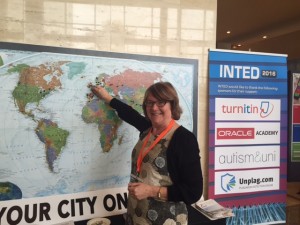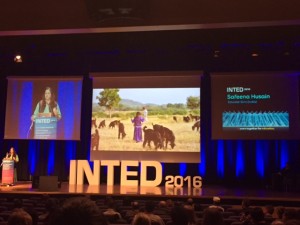INTED 2016 (see #INTED2016 or @debbieholley1 for twitter feed)
Summary:
800 delegates, 70 countries, education and technology as a theme, . In Barcelona in July 2017 full papers only
The little girl pictured looking after her families goats is worth less to them than the goat, explained Safeena Husain, the Founder and Executive Director at Educate Girls – a non-profit organisation that aims at tackling issues at the root cause of gender inequality in India’s education system.
Alan November (http://novemberlearning.com/ )gave a fascinating keynote: he asks his US graduate students; do you know how to ‘Google’ at which point they all look at him…he then shared with us some great Google tips
Wayback machine: every web page since 1995… https://archive.org/
This link will take you back to every single webpage created since 1995, so you can search original pages, edits and see what was happening and how news developed.
Google searches: you probably know about the google search operators, but do your students? E.g Site:mit.edu will search ONLY for items at MIT – there are many control codes that can usefully be used to turn 1,000,000 items of dubious quality into 50 or so items of value (these options are also available with the advanced search: interface https://www.google.com/advanced_search )
Site: and country code will give the country reference, useful getting international perspectives on news stories and other reports country codes and other top level domains from (http://www.domainsherpa.com/top-level-domains/ )
Don’t ban Wikipedia as a source of information – just insist that student search the core references for Wikipedia articles and then use citation information to see what people are doing with now with information from a while ago.
Alan also demonstrated PRISM (http://prism.scholarslab.org/ )– feed in text, share with students and they highlight what they understand – great for large group understanding and instant feedback
Other useful tools and ideas from the conference:
Loads of teacher friendly stuff on Google https://www.edtechteam.com/ check out the expedition link to see video that can easily be streamed via google cardboard…
Useful tool for ‘backchat’ and ‘chatrooms’ that allow student to ask questions and comment.
Todaysmeet.com
Core – searches online repositories (such as ARRO) https://core.ac.uk/ – but this means that you have to be careful what you put in any document that gets uploaded to a repository (such as internal University conferences and seminars) as this may preclude re-using material in other published papers.
Cs50 (introduction to computer science) is the most popular undergrad course at Harvard and Yale. The average amount of time required for students to study BEFORE each1 hr session interactive … 10 – 25 HOURS. It works because it is COLLABORATIVE, blended, learning, using year 2 undergrads to tutor year 1 students. Check out https://www.edx.org/course/introduction-computer-science-harvardx-cs50x
Augmented Reality
Having some great AR practitioners presenting in our stream made for friendships, sharing of practice and links for future collaborations! Ragu Petruse (Sibiu University, Romania) presented on:
Augmented Reality Aided Product Life Cycle Management Collaborative Platform – using Augment (see augment.com) to get his students to animate and build 3D images from 2D manufacturing plans.
And our own presentation (http://www.slideshare.net/debbieholley1/augmented-assessed-addressed-reframing-the-curricula-for-first-year-stem-students ) was well received – we evaluated the experience of a cohort of first year computing science/gaming students as we flipped their learning and engaged them in co-creating team based Augmented Reality trails around the metaphor of a ‘Treasure Hunt’. More on this to follow on our http://AugmentedARU.org blog.
Debbie Holley adding Bournemouth University to the world map at INTED2016










